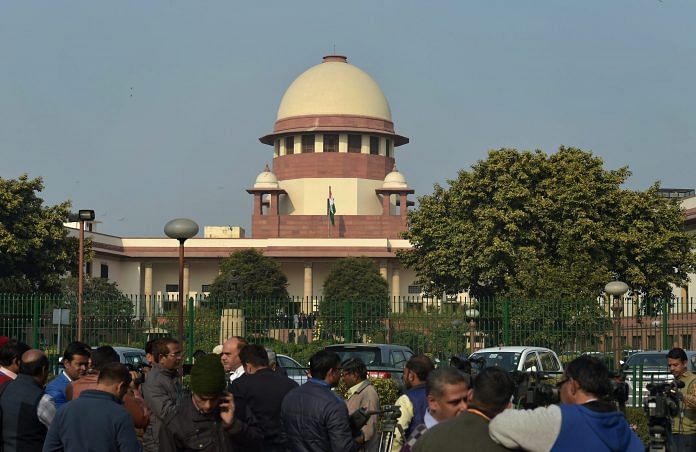Governments throughout the world want a pliant judiciary, but the onus is on the judiciary to push-back. It is no different in India.
There were two very interesting events last week. One was a felicitation of Supreme Court judge Jasti Chelameswar by Lawyers Collective, and other was a seminar organised by the Global Jurists on ‘Independence of Judiciary – A Nationalist Perspective’ in which former chief justice of India T.S. Thakur was the keynote speaker.
The common theme running through both the events was the concern that Prime Minister Narendra Modi government’s continuing interference in higher judiciary, especially matters concerning appointments to higher judiciary, was eroding faith in judiciary. The reasons cited were several but the main ones were: opaque system of appointments through the collegium system, judges being under pressure from the government, corruption in the judiciary, and the deep fissures between senior-most Supreme Court judges and the Chief Justice of India Dipak Misra.
Having reported a bit about issues concerning Indian judiciary, one doesn’t accept the thesis – at least fully.
The aam aadmi’s faith in the judicial system remains as strong as ever – although the faith in the top court judges may have shaken a bit. Lack of leadership by Chief Justice Dipak Misra, his inability to be large-hearted and transparent, especially in his dealings with, at least, some of his senior brother-judges, and the failure of the top court to stand up to the government as one are just some of the reasons why our faith in judges has dwindled a bit.
Merit, or the lack of it, of some of the persons who are appointed judges by the collegium does create a problem of perception about the judiciary.
But this is not something that has happened overnight or after CJI Misra took oath of office – the rot became apparent much earlier. But, yes, his role in, to put it charitably, bringing the top court to the heart of some of the controversies will be remembered.
Judiciary doesn’t need to fear the government; it needs to be afraid of itself and its internal strife.
Unless CJI Misra uses his power as the master of roster to constitute a bench during the ongoing summer vacations, in which Justice Chelameswar is a member, the country may have seen the last of him as a Supreme Court judge.
But, some of the points raised by him in his letter to CJI Misra were about the issue of the government sitting on Karnataka judicial officer P. Krishna Bhat’s elevation. Few people now remember that Chelameswar had dissented in support of the National Judicial Appointments Commission (NJAC) Act, which was one of the first acts of the Modi government to rein in higher judiciary. This gives an insight into why the judiciary needs to be fearful of itself.
Consider this: it has been over a month since the Centre returned the collegium’s recommendation to elevate Uttarakhand high court Chief Justice K.M. Joseph. The Supreme Court collegium decided two weeks ago to reiterate his name but, for some reason, the decision hasn’t been made public so far and not communicated to the government.
Unless it is somebody’s claim that the Modi government has somehow prevailed upon the collegium to not send Joseph’s name back, or to not send it without more names, the collegium can’t escape the criticism that it bowed down to the government. This, then, raises an important question: why is the collegium headed by the CJI so afraid of taking on the government?
Governments throughout the world want a pliant judiciary, but the onus is on the judiciary to push-back and protect its independence. It is no different in India. But, a divided Supreme Court, which also seems to have lost sight of its priorities on the crucial issue of speedy justice delivery system, is not capable of doing that.
I know it may rile some, but I believe the Supreme Court collegium should have reiterated Joseph’s name within 24 hours. CJI Misra should have appended a polite but firm letter to the Centre that unless the government clears all the pending names, it won’t get more.
The responsibility for ensuring an end to the huge vacancies in the higher judiciary lies with the government, and not the collegium.
Or else, the current CJI can do what CJI Thakur did when this government started sitting, without offering any explanation, on names cleared by the collegium. The CJI-headed bench had summoned the attorney general back then and asked him the reasons for the delay.
Within days, the files started moving and the law minister of the country was even taking credit for the government having cleared a record number of appointments – appointments that the court had actually forced it to process!
I doubt CJI Misra will ever consider this option. He isn’t Justice Thakur, who enjoyed the trust and support of almost the entire court.
POST-SCRIPT: Retired judges must always be remembered for their important judgments, and that is why Justice Chelameswar will be remembered for his wonderful dissent in the NJAC case.
This dissenting judgment somehow also shows the way forward for the judiciary.
Chelameswar wrote: “The question is what is the formula by which judges who can decide cases quickly and also generate confidence in the masses and litigants be produced.”
On judicial appointments, he favoured the NJAC over the opaque collegium system. “There is no accountability in this regard. The records are absolutely beyond the reach of any person including the judges of this court who are not lucky enough to become the Chief Justice of India,” he wrote.



